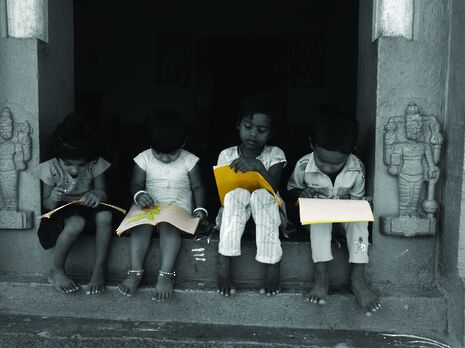Why does no one write poetry for kids anymore?
Children’s poetry is too important to be so increasingly marginalised, argues Jeremy Wikeley

“There are holes in the sky / Where the rain gets in / But they’re ever so small / That’s why the rain is thin.” The effect, and the humour, of this poem by Spike Milligan comes from the thought of what might be outside the sky. Imagine: a terrifying, sublime amount of water. Is it a layer encircling the earth like the outside of a chocolate truffle? Or is the world rolling around, suspended in an endless ocean? It’s a very good poem.
It also happens to be for children. Last week the poet and broadcaster Roger McGough, who has spent a long career writing warm and witty poems for a range of age groups, criticised the lack of new verse being published for kids. Speaking in his capacity as chair of the judges for the 2015 Children’s Poetry Award, McGough expressed that he was "sorry that there were not more submissions and that so few publishers are producing books for children and young people."
McGough made similar noises back in 2013. Whether his remarks accurately reflect the state of the UK’s publishing industry remains to be be seen. However, his criticisms clearly echo growing concerns about the declining role of poetry in the lives of British children.
Why should this matter to young adults? For one thing, poetry helps children learn how to use language. Another prominent poet, the indefatigable Michael Rosen, has been working for a long time to defend and promote poetry and lyricism for children, both in schools and at home. Rosen campaigns against the increasingly muddled and barbaric education policies of successive British governments, particularly the fact that children are taught to read through the use of phonics rather than verse and stories. Incidentally, his blog is well worth a look; he’s currently peppering it with verses on the election.
An appreciation of poetry and a love of language is picked up at a young age. When poets discuss their influences they often cite a recent (but not too recent) figure who they respect and admire. But no eight-year old reads John Berryman. Poetry doesn't have a particularly high profile in national life as it is, and if children don’t read it, it slips further down the pecking order.
Of course, music and song pick up much of the slack, as do literature and films. But poetry does things with language and meaning that these mediums can’t. So, at the risk of seeming paternalistic, it’s worth worrying about who’s reading it.
If you're interested in poetry, you should be interested in children’s poetry. Not necessarily the stuff itself, although a number of brilliant writers have proved that poetry for children can be as joyous and perplexing as anything written for adults. The American poet Richard Wilbur’s Opposites is a good example: “What is the opposite of two? / A lonely me, a lonely you.”(Wilbur also enquires into the opposite of doughnut, which turns out to be“a cookie with a whole around it.”)
A lot of children’s poetry is about shoes and toothpaste and jabberwockies. You’d be forgiven for wanting to spend your time on something else. But children’s poetry has a lot to tell us about poetry in general. It reminds us of two simple values: simplicity and memorability. Simplicity doesn't necessarily mean triviality. Michael Rosen, in fact, insists that even children’s poems shouldn’t be trivial, in part because stimulating content aids learning but also because children shouldn’t be spoken down to.
Anything worth saying can usually be said clearly. Simplicity helps expose a poet's ideas and encourages a certain intellectual humility. A lot of poetry written for adults, like children’s poetry, just plays around with ideas. It rarely comes from a place of great understanding and it would not necessarily be good poetry even if it did.
Children’s poetry highlights the fact that the same techniques – rhythm, rhyme, texture– which help a child through the text are what make a poem easy to remember. We grown-ups may no longer need these markers the first time we read a piece. But if a poem is going to stay with us for any length of time these sort of tricks are essential.
Not that I’m advocating rote learning: I’ve never quite understood the need to recite whole pieces by heart, although it’s a wonderful skill to have. Rather, it’s better if an idea is given the space and time to reverberate around inside you for a while. The fact is thoughts get lost very quickly if they have nothing to distinguish them (even the ones we really take to heart). So spare a thought for the children; you may end up sparing a thought for yourself.
@jbwikeley
 News / 27% of Cantabs have parents who attended Oxbridge13 June 2025
News / 27% of Cantabs have parents who attended Oxbridge13 June 2025 News / Downing’s rugby team apologises over ‘inexcusable’ social media post12 June 2025
News / Downing’s rugby team apologises over ‘inexcusable’ social media post12 June 2025 News / 2025: The death of the May Ball? 13 June 2025
News / 2025: The death of the May Ball? 13 June 2025 Comment / Why Cambridge needs college chapels11 June 2025
Comment / Why Cambridge needs college chapels11 June 2025 News / Academics seek to restrict University’s use of injunctions 16 June 2025
News / Academics seek to restrict University’s use of injunctions 16 June 2025




